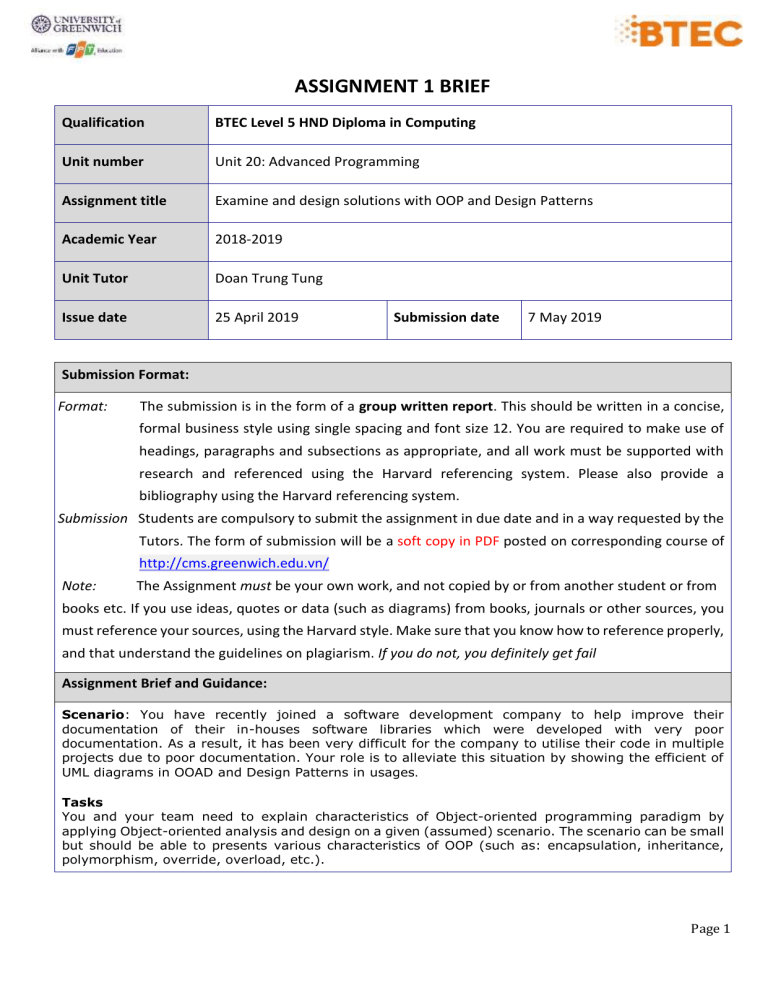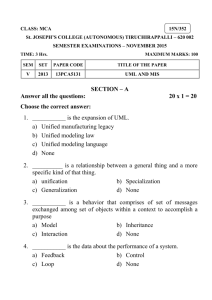
ASSIGNMENT 1 BRIEF Qualification BTEC Level 5 HND Diploma in Computing Unit number Unit 20: Advanced Programming Assignment title Examine and design solutions with OOP and Design Patterns Academic Year 2018-2019 Unit Tutor Doan Trung Tung Issue date 25 April 2019 Submission date 7 May 2019 Submission Format: Format: The submission is in the form of a group written report. This should be written in a concise, formal business style using single spacing and font size 12. You are required to make use of headings, paragraphs and subsections as appropriate, and all work must be supported with research and referenced using the Harvard referencing system. Please also provide a bibliography using the Harvard referencing system. Submission Students are compulsory to submit the assignment in due date and in a way requested by the Tutors. The form of submission will be a soft copy in PDF posted on corresponding course of http://cms.greenwich.edu.vn/ Note: The Assignment must be your own work, and not copied by or from another student or from books etc. If you use ideas, quotes or data (such as diagrams) from books, journals or other sources, you must reference your sources, using the Harvard style. Make sure that you know how to reference properly, and that understand the guidelines on plagiarism. If you do not, you definitely get fail Assignment Brief and Guidance: Scenario: You have recently joined a software development company to help improve their documentation of their in-houses software libraries which were developed with very poor documentation. As a result, it has been very difficult for the company to utilise their code in multiple projects due to poor documentation. Your role is to alleviate this situation by showing the efficient of UML diagrams in OOAD and Design Patterns in usages. Tasks You and your team need to explain characteristics of Object-oriented programming paradigm by applying Object-oriented analysis and design on a given (assumed) scenario. The scenario can be small but should be able to presents various characteristics of OOP (such as: encapsulation, inheritance, polymorphism, override, overload, etc.). Page 1 The second task is to introduce some design patterns (including 3 types: creational, structural and behavioral) to audience by giving real case scenarios, corresponding patterns illustrated by UML class diagrams. To summarize, you should analyze the relationship between the object-orientated paradigm and design patterns. The presentation should be about approximately 20-30 minutes and it should be summarized of the team report. Learning Outcomes and Assessment Criteria Pass Merit Distinction LO1 Examine the key components related to the object-orientated programming paradigm, analysing design pattern types P1 Examine the characteristics of the object-orientated paradigm as well as the various class relationships. M1 Determine a design pattern from each of the creational, structural and behavioural pattern types. D1 Analyse the relationship between the objectorientated paradigm and design patterns. LO2 Design a series of UML class diagrams P2 Design and build class diagrams using a UML tool. M2 Define class diagrams for specific design patterns using a UML tool. D2 Define/refine class diagrams derived from a given code scenario using a UML tool. Page 2

